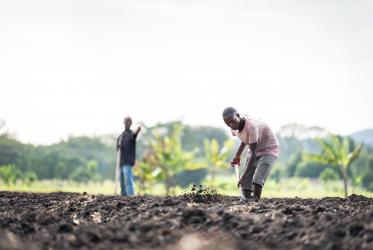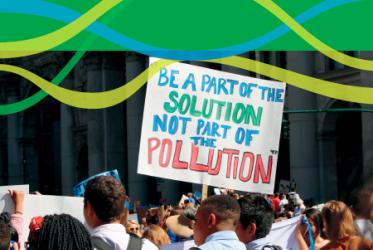Yaoundé, Cameroon, 12 January 2000
A sub-regional seminar on "Debt in Central Africa" was held in Yaoundé, Cameroon, from 10 to 12 January 2000. The seminar falls within the framework of the Accra, Lomé, Johannesburg and Lusaka meetings.
It was jointly organised by the World Council of Churches (WCC), the All Africa Conference of Churches (AACC), the Federation of Protestant Churches and Missions of Cameroon (FEMEC) and the Ecumenical Service for Peace (SeP), Cameroon.
Apart from nationals of Central African countries and Mauritius, the seminar equally saw the participation of resource persons from various organisations of the North and the South that advocate debt cancellation (Eurodad, Uganda Debt Network, Jubilee 2000 South Africa, Jubilee 2000 London Africa Initiative).
There was a consensus on the following leading ideas:
- The debt of poor countries should be completely cancelled! This is a main prerequisite for poverty and misery alleviation and for regaining their dignity;
- The struggle for debt cancellation is a struggle for social justice. It aims to free the human person from the yoke of everlasting economic domination and slavery. The fight concerns all of us. All the components of civil society, without exclusion, should contribute to the fight;
- Debt is not only an economic problem. It is a fundamentally moral and ethical problem which requires various solutions -political, legal and social.
The situation of heavily indebted poor countries is alarming. Most of these countries are from Sub-Saharan Africa and no Central African country is spared. World Bank data indicate that the 1995-combined total foreign debt of the countries concerned (Burundi, Cameroon, Congo Brazzaville, Democratic Republic of Congo, Central African Republic, Gabon, Equatorial Guinea, Rwanda and Chad) was in the neighbourhood of the mammoth sum of 40 billion US dollars.
This concentration of misery in this part of the world is not the outcome of a curse of fate, but of the ill effects of frenzied capitalism, arbitrary terms of trade, the egoism of those in power and the racketeering of lenders.
Forty to fifty percent of the fiscal revenue of the above-mentioned states is devoted to debt servicing; added to which are expenditures on arms purchases. The Structural Adjustment Programmes (SAPs) bring about drastic cuts in social and environmental consequences. The death of millions of people could be avoided if the amounts devoted to debt servicing could be used for more just and human purposes.
Accordingly, the maintenance, in any form whatsoever, of the debt of poor countries is unacceptable!
This is our stance, We, participants at the Yaoundé meeting, inspired by the Biblical tradition of Jubilee (Leviticus 25:10-17; Nehemiah 5:11; Luke 4:16-20) and the action of many organisations and people the world over, advocate total debt cancellation and back the Jubilee Movement.
This seminar, which was held after the G7 summit in Cologne (Germany), was a timely opportunity to assess the anti-debt struggle, evaluate the actions of Jubilee 2000 and map-out future strategies and guidelines. In this connection, it was necessary to question why French-speaking countries were lagging behind English-speaking countries and reflect on the ways and means of taking the Central African sub-region out of its inaction.
Basically, it was a bid to build the capacities of the sub-region as regards awareness on the debt problem that the Yaoundé meeting set the following objectives inter-alia:
- to sensitise the nationals of the sub-region toward a greater mass mobilisation and assist them in promoting constructive actions and initiatives, bearing in mind the peculiarities of their respective countries;
- to secure the integration of the sub-region in the global Jubilee coalition;
- to define the methods for a more efficient participation at the global level while examining the peculiar problems of the sub-region from a wider perspective.
Following the proceedings, the participants solemnly and unanimously agreed on the following:
- the need to go beyond the Jubilee objectives to place the debt issue in the wider context of the fight for economic and social justice;
- scheduling over time and space of Jubilee actions toward a long struggle;
- setting up of national coalitions and a strong and well organised sub-regional network;
- the effective mobilisation of all social actors: states, NGOs, trade unions, religious associations, political parties;
- the establishment of dialogue and earnest partnership between the civil society and governments;
- the enhancement of civil society participation in negotiation on debt;
- the demystification of the debt issue by wide information dissemination;
- the education and sensitisation of masses using adequate training resources;
- setting up of a network to work toward the immediate repatriation of state funds illegally taken abroad;
- the intensification of the fight against poverty, social inequalities and corruption;
- the design and implementation of an adequate plan of action;
- the formulation of a strategy and common platform ahead of upcoming meetings, especially the OAU summit to be held June 2000 in Lomé (Togo) and the G7 summit to be held in July 2000 in Japan.
The ultimate objective of these measures is to arrive at the total and immediate cancellation of the debt of all indebted poor countries in the South. It is not a question of charity; it is a question of justice.
Yaoundé, 12 January 2000
Colloquium for the Central African Sub-Region on Jubilee in Africa and Capacity Empowerment
of Churches and Civil Society
Action Plan and Project
The representatives of churches, syndicates, NGOs and media of the following countries: Burundi, Cameroon, Central Africa Republic, Chad, Congo-Brazzaville, Congo-Kinshasa, Gabon, Rwanda as well as representatives from Belgium, Mauritius Island, South Africa, Sweden, Uganda and the United Kingdom, meeting in Yaoundé, from 10 to 12 January 2000, as a sub-regional colloquium on debt for jubilee 2000 in Africa under the theme: "Empowerment of the Capacities of Churches and Civil Society";
- considering the various lectures delivered by eminent specialists,
- considering the animating and constructive discussions,
- conscious of the concrete follow-up actions by Churches and Civil Society in general and in Central Africa in particular;
decided to realise the following sub-regional and country-specific plan of action (date, activity and objective):
January 2000, creation of a sub-regional network - "Jubilee 2000 Central Africa"
- information diffusion
- co-ordinating activities in the sub-region;
February - April 2000, meeting for information dissemination to target population through opinion leaders
- launching of national networks (where they do not yet exist)
- extension and official launching in Cameroon:
May 2000, memorandum to the heads of state
- insist that debt issue be discussed at the OAU summit in Lomé, Togo
July 2000 (15 July), public meetings, coordinated Africa Action Day - (end-July), evaluation
- sensitise population and opinion on the G7 meeting at Okinawa, Japan
Each country will develop a programme of awareness-raising, education on the issue of economic justice and to lobby their government according to their context and realities.
NB: The coordinators of the Ecumenical Service for Peace in Cameroon network will develop a data base on activities in the sub-region in cooperation with the World Council of Churches (WCC), European Network on Debt and Development (EURODAD), Jubilee 2000 London, etc.



